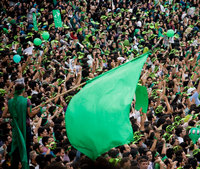With events still unfolding inside Iran, it is not yet clear how things will pan out for the Islamic Republic, which now faces its greatest challenge since the regime's early revolutionary days. But the reverberations of Iran's internal tumult since the June 12 presidential elections are potentially far-reaching: Iran's Arab neighbors, Israel, the European Union and, perhaps most importantly, the United States, are all observing developments closely to see how the crucial Middle East power's internal ructions might impact their own strategic interests.
The Obama administration initially chose to tread cautiously, not wanting to hand Iran's hardliners a rhetorical weapon to use against reformists by labeling them as "agents of foreign interference." But with the crackdown against protests becoming increasingly brutal, President Barack Obama earlier this week finally condemned the use of state-sanctioned violence against Iranians participating in demonstrations.
Obama must now consider whether the option of engaging in "tough diplomacy" with Iran can still be pursued, especially if offering an "open hand" means negotiating with a regime under a cloud of suspicion for election-rigging. The violent suppression of the Iranian opposition's outrage over the declared margin of President Mahmoud Ahmadinejad's victory will only complicate that calculus.

